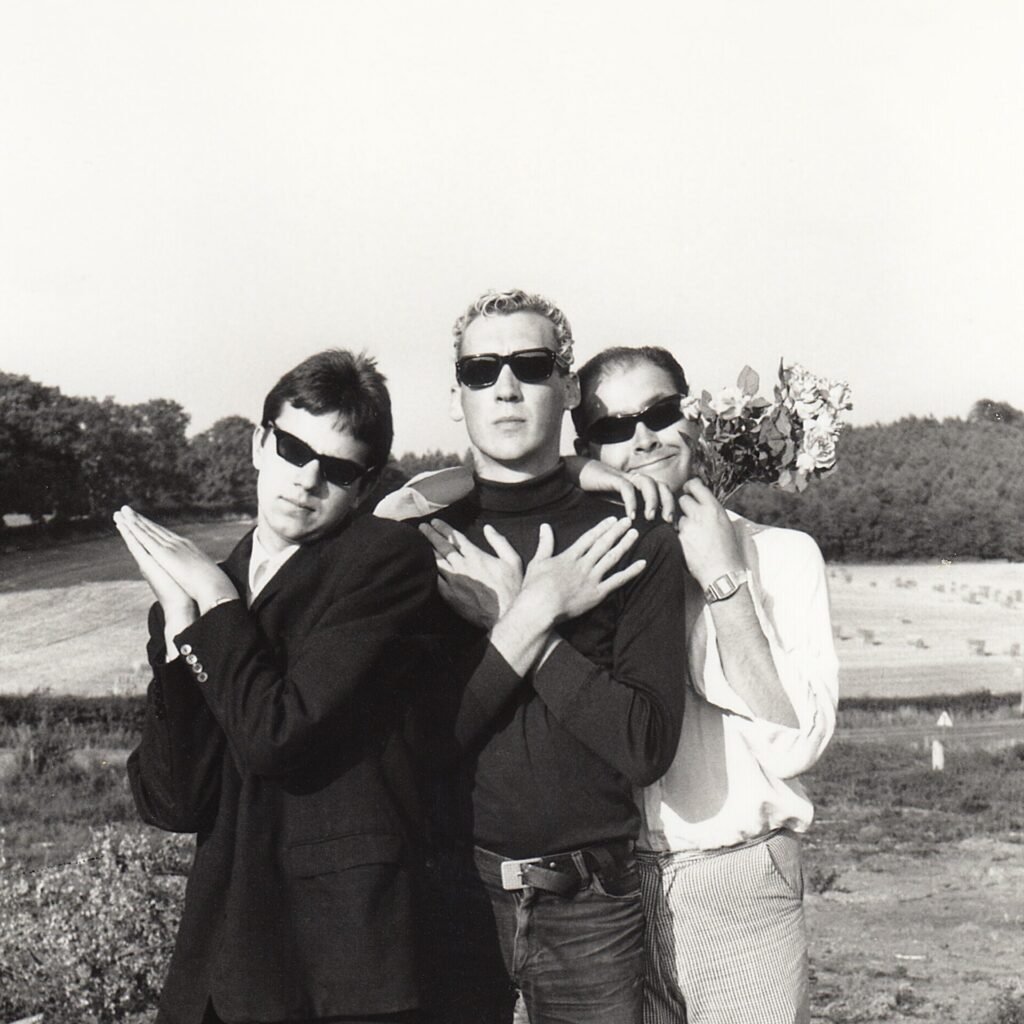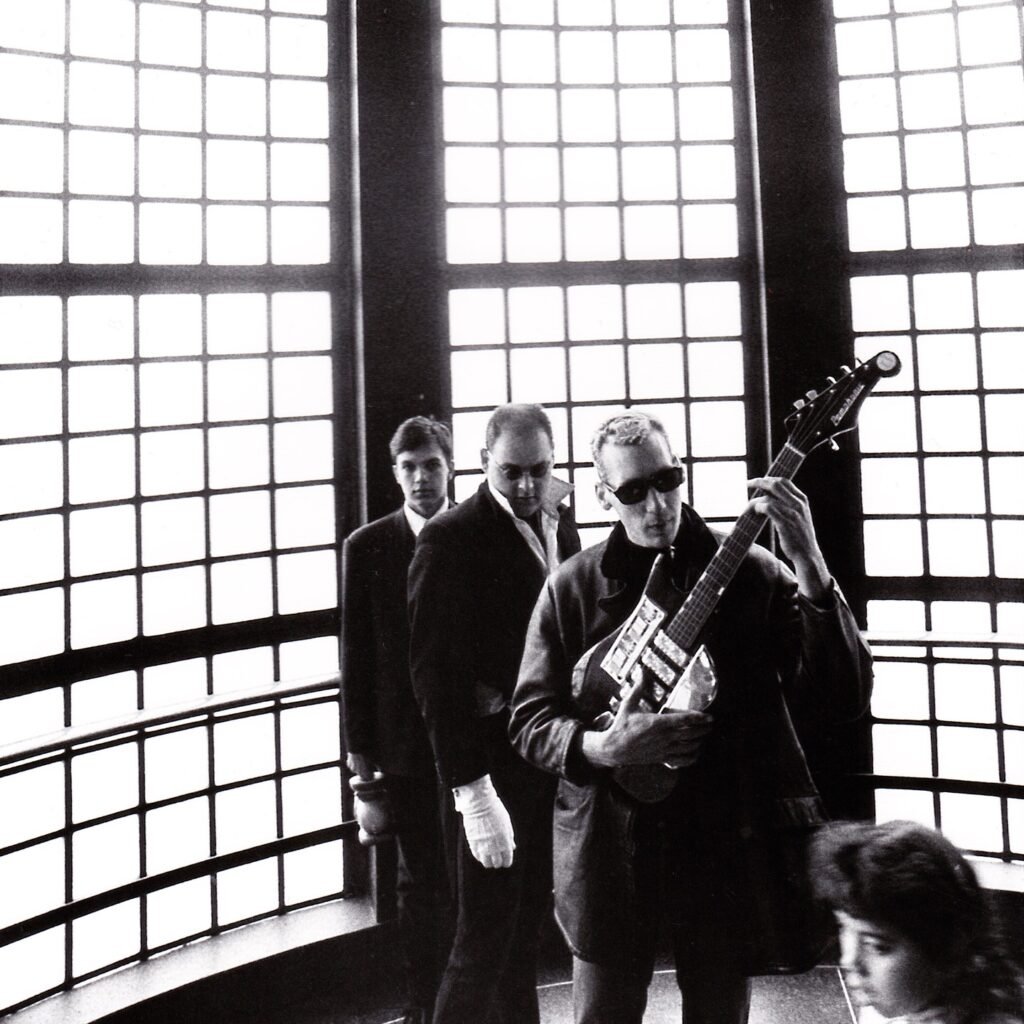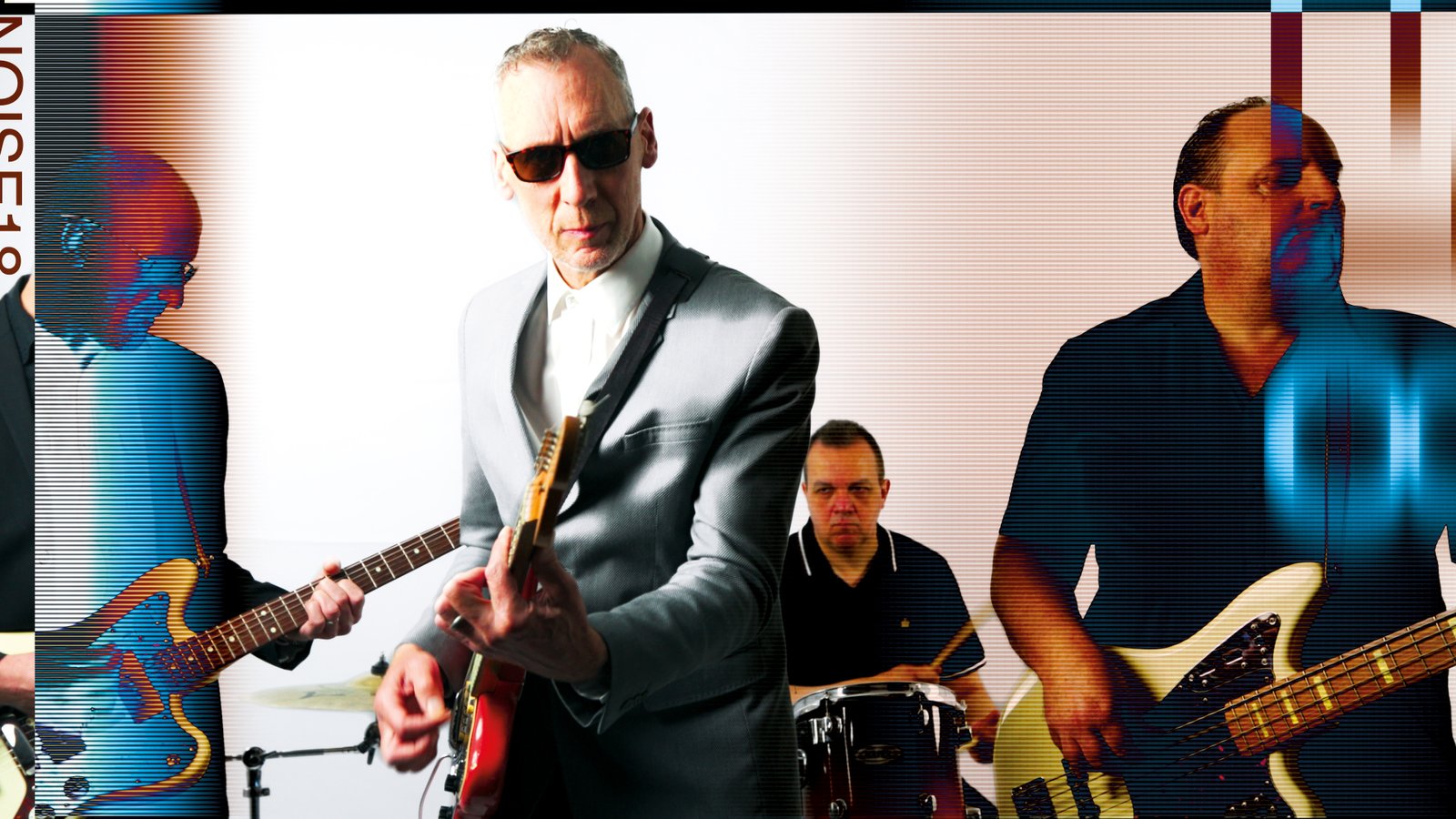The Very Things were one of various outfits launched under the umbrella organization of the Dada Cravats Laboratory (DcL), based in Redditch, Worcestershire, England. This group operated a number of musical projects under Dada principles: ‘Using that banner was a lot simpler than delivering lengthy manifestos’. The key personnel involved were The Shend (b. Chris Harz; vocals) and Robin R. Dallaway (aka Robin Raymond; guitar), plus Gordon ‘DisneyTime’ (drums), and Fudger O’Mad aka Budge (ex-And Also The Trees; bass). Other groups operating out of the same stable included the Cravats, Babymen, and DcL Locomotive. Check out the exclusive interview below:

1. Can you tell us a bit about where you come from and how it all got started?
Robin (RR) Dallaway, THE VERY THINGS GXL: I’ve mostly lived in Worcestershire, England, apart from a spell in London when The Very Things was particularly busy recording and doing shows in the late ‘80s.
Making music all started with punk, which was like year zero for me. It changed my life, abruptly and forever. As it did for many others. I can pin-point the time and place when my ‘road to Damascus’ event occurred, except that it was the ‘road to Moseley’ in Birmingham. I had started an art foundation course at Birmingham Polytechnic in September ’76 and driving home to Redditch in late October, I was listening to an old transistor radio in the car. It wasn’t very loud, so when I heard this stunning track, crackling with energy, I had to pull over to make sure I could hear who it was by. It was the Dave Lee Travis drive-time show and he said, “Well, that was The Damned with ‘New Rose’ and we certainly won’t be playing that again”. I was genuinely stunned, staring at the radio. It was the best thing I’d heard for years, and it wasn’t going to be played again. I couldn’t believe it.
Anyway, in March ’77, having bought the single ‘Grip’, a few of us went to see The Stranglers at Barbarella’s nightclub in Birmingham, which was a remarkable night. I wanted to be Hugh Cornwell. So, on the way home, we decided to form a band, which we subsequently called ‘The Cravats’, a name in the vein of ‘50s and ‘60s vocal groups. We started meeting on Saturday afternoons to drink and make a noise and it didn’t take long before we were attempting to play gigs. To cut a long story short, we managed to get a self-pressed single ‘Gordon’ to Radio 1’s John Peel, who took to us and played it, which was an absolutely amazing feeling. Hearing the single we’d made on Radio 1. As a result of that, Pete Stennett signed us to the legendary London label, Small Wonder. We subsequently made two albums and recorded four Peel sessions before another Cravats founder member, The Shend, and I founded The Very Things in 1983.
2. Did you have any formal training or are you self-taught?
THE VERY THINGS GXL: I’m self-taught. I grew up surrounded by music (my older brother was a DJ, playing Soul, R&B and Ska DJ). It never occurred to me to actually play music until punk exploded and, in the rush of excitement, we formed a band before we could play. After a while, I gave myself a crash-course and studied a range of music, trying to understand how it was put together which needed a different way of listening. I taught myself to play guitar and keyboards (with more enthusiasm than technique).
3. Who were your first and strongest musical influences and why the name ‘THE VERY THINGS GXL?
THE VERY THINGS GXL: My earliest influences were my brother’s choices, mainly Tamla Motown and Stax artists, like The Four Tops and Otis Redding. Art Rock from the early ‘70s (Roxy Music, David Bowie, Iggy Pop) and punk & post-punk from the mid ‘70s (Buzzcocks, B52s, Devo) are all a huge influence, as is ‘70s funk and disco (Chic, James Brown) and ‘90s house and dance (Basement Jaxx, Roni Size, Daft Punk). And more recently Gorillaz, St. Vincent, Goldfrapp, Working Men’s Club, Justice, Jungle and Young Fathers, among many others.
When we started this project, we named the band ‘The Very Things’ because it seemed to be flexible, much like the idea for the band itself, which was set up to contain various styles and directions. But having said that, it might put you in mind of some kind of 1930s English jazz band, which is a nice surreal image. The ‘GXL’ suffix adopted for the latest album, ‘Mr. Arc-Eye (under a cellophane sky’, denotes a new phase for the band, but is also a tongue-in-cheek reference to trim levels offered by Ford Motors UK for its 1970s Mark III Cortina: Base L (Luxury), XL (Xtra Luxury) and top of the range GXL (Grand Xtra Luxury). Our first album, ‘The ‘Bushes Scream While My Daddy Prunes’ was badged ‘The Very Things DCL’ (referring to our umbrella art organisation at the time, The DadaCravat Laboratory).
4. What do you feel are the key elements in your music that should resonate with listeners, and how would you personally describe your sound?
THE VERY THINGS GXL: I would say that it’s hard to pigeon-hole. It has been described as shapeshifting, which is certainly true, but it all has a post-punk vibe – energetic, arty, eclectic. I would say early Roxy Music and Bowie, Talking Heads, Young Fathers and Public Service Broadcasting are possible references. John Robb at Louder Than War described it as, “..a dark energy that you can dance to and another music in a different cinema for films you can’t even see”, which I really like.

5. For most artists, originality is first preceded by a phase of learning and, often, emulating others. What was this like for you? How would you describe your own development as an artist and music maker, and the transition towards your own style, which is known as post-punk / art pop?
THE VERY THINGS GXL:
Good question. The Very Things, as mentioned, was heavily influenced by post-punk, but even from the very start, it had a range of other influences and was about ideas. In a very unorthodox way it incorporated dance music, Krautrock, ‘found sounds’ and various other unusual sources of inspiration, such as ‘50s rockabilly and TV theme music. That ‘magpie’ eclecticism continues to the current Very Things GXL releases.
6. What’s your view on the role and function of music as political, cultural, spiritual, and/or social vehicles – and do you try include any of these themes in your work, or are you purely interested in music as an expression of technical artistry, personal narrative, and entertainment?
THE VERY THINGS GXL:
Another great question. I would say that music is capable of doing many things, including everything that you mention, but most importantly it influences the way you feel. I don’t think it should have a particular role, it can have a number of effects, some at the same time; it can amuse and entertain you, make you dance, think or give you a glimpse into the past or future or another world. I would say that most music will be, to some degree, reflective of the times it was created in, whether consciously or unconsciously. The Very Things GXL music is very much driven by ideas but, for me, it must work on several levels – to be visceral, exciting and entertaining, with some overarching idea that reflects my experience of the world and life. I like the thought of stimulating reflection, encouraging listeners to wonder whether we all experience things in the same way, to reflect on things, to ask questions about how and why things happen.
7. Do you feel that your music is giving you back just as much fulfillment as the amount of work you are putting into it or are you expecting something more, or different in the future?
THE VERY THINGS GXL: I think I’d kind of got used to the general low expectations of ‘pop’ music generally and occasionally wondered if it was the correct medium for me to use for the ideas I’ve had. But I’ve stuck with it, still in love with music and using it to make sense of everything. Our new album ‘Mr. Arc-Eye (under a cellophane sky)’ has received amazing reviews so far, which is incredibly exciting, gratifying and very encouraging. I love hearing other people’s take on the album, hearing what it means to them. I believe (as some reviewers seem to) that this is the best work I’ve done so far, which is wonderful but also quite daunting. We seem to have raised the bar a bit further for ourselves…
8. Could you describe your creative processes? How do usually start, and go about shaping ideas into a completed song? Do you usually start with a tune, a beat, or a narrative in your head? And do you collaborate with others in this process?
THE VERY THINGS GXL: Again, another great question! It can be in any of those ways, and more besides. I have learned not to rely on my memory; I frequently get up in the night having dreamed or thought about an idea, typically a scrap of lyric and tune, often together, sometimes a whole song. The challenge is then to get them down in some form that will make sense to me later. I usually play guitar or just sing or hum or primitively beat-box ideas into the voice memo on my ‘phone. In my waking life, there is sometimes a theme running through my mind, which allows me to play with ideas within that theme in various ways. These manifest themselves into musical or lyrical fragments, which I try to allow to nurture and develop. It seems that my mind can kind of do that in the background, whilst I’m doing other things. I often liken this to the way that sometimes in the dark, if you look slightly away from an object, you can see it with more clearly than if you were staring directly at it.
More often than not, I develop whole ideas to work on before recording a demo, or working in the studio. I certainly do collaborate, and input from others in the band can be valuable and exciting. I think it’s up to me to use that input in the service of the track we’re working on, and when contributions are being used, it’s for me to work in a producer/editor role in arranging it and making sure it works.
9. What has been the most difficult thing you’ve had to endure in your life or music career so far?
THE VERY THINGS GXL: These questions are really good! There was a very difficult period when my first band, ‘The Cravats’, re-formed without me after being dormant for a long time. I was experiencing some health problems at the time. Early albums, containing many of my songs, lead vocals and playing, included only vague credits and although I fronted the band for many years, my involvement started to disappear, with another co-founder taking my place. There was a lot of ill-feeling and upset, which thankfully I have managed to leave behind. I’ve since worked on re-releases with the band (organising tracks, recreating my original artwork, etc.) and I’m on good terms with my former colleagues, one of whom, saxophonist Svor Naan, guested on the new Very Things GXL album.
10. Conversely, what would you consider a successful, proud or significant point in your life or music career so far?
THE VERY THINGS GXL: Now. Right now. Quite honestly, I am happier with the ‘Mr. Arc-Eye (under a cellophane sky)’ album than I’ve ever been before with a release. I’ve always been very self-critical (I think it’s the only way to improve) so have often been less than completely happy with releases, particularly with the physical albums. So, I’m not used to this feeling, but I am completely happy with the latest album, in terms of not only the content, recording and mastering, but also the artwork, packaging and videos.
11. With social media having a heavy impact on our lives and the music business in general, how do you handle criticism, haters, and/or naysayers in general? Is it something you pay attention to, or simply ignore?
THE VERY THINGS GXL: We’re very, very lucky that the latest releases have all been well received, by both listeners and critics. We’re pretty active on social media but have only had a couple of less-than-positive comments, and those were not really about the work. I’ve just ignored them. It’s a very odd phenomenon, the whole haters thing, hiding behind a virtual identity. I’m not sure what they get out of being that negative. But, happily, we don’t have much of that to contend with.
12. Creative work in a studio or home environment, or interaction with a live audience? Which of these two options excites you most, and why?
THE VERY THINGS GXL: Ahh, studio, definitely. I find it really exciting and very fulfilling to get ideas down and start to arrange them. I absolutely love that part of working. I often have much of it in mind before we start, but I particularly enjoy it when we find and apply a new instrument or ‘found sound’ that brings the whole track into focus. I love it.
13. Do you think is it important for fans of your music to understand the real story and message driving each of your songs, or do you think everyone should be free to interpret your songs in their own personal way?
THE VERY THINGS GXL: This is hard to talk about without sounding pretentious, but here goes. I think there has to be room for interpretation. But, if I’ve done my job properly, then it should invite you in, to be stimulating physically, mentally, or hopefully both. I hope that it would make you nod your head, dance, think, imagine… maybe cause questions to arise. For me, the best creativity works on a few levels. I love dance music, and the effect that has on your body, making you want to move. I love music you can sit and listen to and dream. We try to make The Very Things GXL tracks a mix of both – engaging and stimulating, maybe transporting you to ‘a different place’, maybe encouraging you to imagine one of those films that has never been made.
Thanks very much for your interest and for asking such excellent questions!
Robin
KEEP IN TOUCH:
FACEBOOK | INSTAGRAM | TWITTER | SPOTIFY | BANDCAMP | TIKTOK | WEBSITE | YOUTUBE


